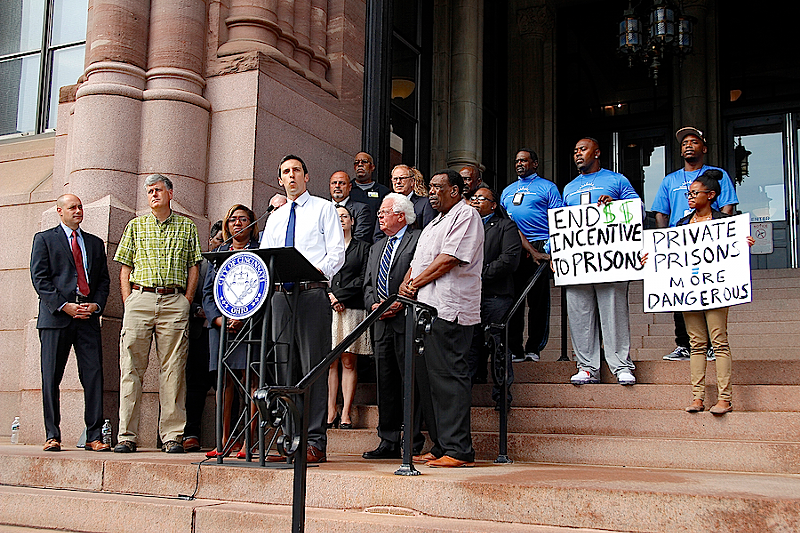
Cincinnati officials say they’d like to get the city’s pension investments out of the private prison business.
The city of Cincinnati’s pension fund holdings include more than $2.5 million in stocks for private prison companies. But an effort spearheaded by Councilman P.G. Sittenfeld’s office and backed by a majority of council and Mayor John Cranley is seeking to divest from nearly 600,000 shares in CoreCivic, GEO Group and G4S currently held by the city’s pension system. Those companies own and run private prisons, including some in Ohio.
“If you want a glimpse into a person or a city’s values, then follow the money,” Sittenfeld said during a news conference today announcing the effort. “And the money that flows into the private prison business is a stain on our community. We should not and we will not use public funds to prop up this immoral enterprise.”
Council members David Mann, Yvette Simpson and Wendell Young appeared at the news event and spoke in support of divesting from the private prison companies, and Councilman Chris Seelbach also supports the policy directive. That’s enough to push the move through council, though it would still need to be approved by the city’s pension board. Council appoints four members of the nine-member board; the other city pensioners and other board members elect the other five.
Sittenfeld says the board wasn’t aware of the investments in the companies and that his office started looking into it after New York City moved to divest $48 million invested in private prison companies by its pension fund.
A number of groups say they support the move. Rev. Troy Jackson of the Amos Project, which represents more than 50 local faith congregations; Pastor Peterson Mingo, a longtime community activist; representatives from the American Civil Liberties Union; Cincinnati’s NAACP chapter; and the Ohio Justice and Policy Center all appeared at the news conference to speak in support of divesting in private prisons. Former Ohio Gov. Ted Strickland also attended the event to lend his support to the effort.
Profiting on incarceration is immoral, those opposed to for-profit prisons say.
“When revenues drive decisions, everyone associated with those prisons, including inmates, guards, family members, contractors and the community at large suffer — all except the profiteers,” said ACLU of Ohio’s Jay Bennett Guess. “For-profit prisons only create incentives for corporations to lobby for more laws to criminalize more people that feed our already-bloated criminal justice system.”
In 2012, CityBeat detailed myriad problems with Ohio’s private prisons, which were at the time operated by three companies including the GEO Group. The companies that now operate the state’s two remaining private prisons — Corrections Corporation of America and Management and Training Corporation — are not represented in the city’s pension holdings.
Critics say for-profit prisons are incentivized to keep people incarcerated and that their rise over the past few decades has contributed to America’s mass incarceration problem. Though it has just five percent of the world’s population, America holds a quarter of all incarcerated people in the world in its prison system. What’s more, people of color bear the brunt of that incarceration — blacks, for example, are 10 times more likely than whites to be imprisoned for drug offenses, despite research that shows drug use between the two groups is roughly equal.
A 2012 study by George Washington University found that assaults on prison guards by inmates were more than 50 percent higher in private prisons and that assaults between inmates were 66 percent higher. Experts attribute that to inadequate training and lower staffing levels at private prisons.
Under President Barack Obama, the federal government was set to begin ending partnerships with private prisons that housed federal prisoners.
“They simply do not provide the same level of correctional services, programs and resources; they do not save substantially on costs,” then-Deputy Attorney General Sally Yates wrote in a memo last year. “And as noted in a recent report by the Department’s Office of Inspector General, they do not maintain the same level of safety and security.”
President Donald Trump has reversed the decision, however, after Core Civic and GEO gave hundreds of thousands of dollars to the Trump campaign and his inauguration fund. The federal government recently signed $774 million in contracts with GEO.
The Obama administration’s recently reversed move didn’t cover the vast majority of for-profit prisons, which contract with individual states. Last year, Ohio officials indicated they would not follow in the federal government’s footsteps and terminate contracts with for-profit prisons. But despite reticence from many conservative leaders up to Ohio Gov. John Kasich, some in the state's criminal justice administration have blasted private prisons.
Chris Mabe, President of the Ohio Civil Service Employees Association, is a three-decade veteran of Ohio’s rehabilitation system, currently serving as a corrections sergeant at the Lorain Correctional Institution. He decried the “unholy cause” of prison privatization.
“Coming from the department of corrections, there’s a difference in the model of state prison system as opposed to a prison that functions for profit,” Mabe said at the news conference today. “We have a moral compass in the department of corrections when it comes to right and wrong. We have a job of rehabilitation and not re-incarceration for profits. We respond to the taxpayers, the families and the citizens of the state, not to a board of directors and people who hold value in investments.”





